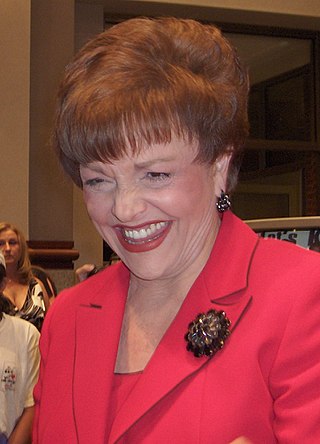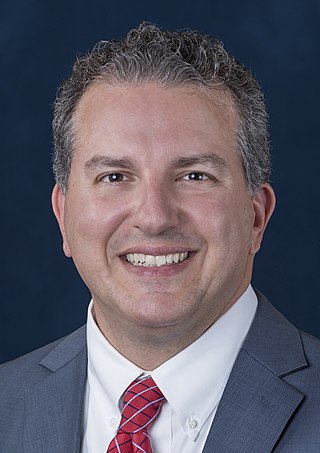
The governor of South Carolina is the head of government of South Carolina. The governor is the ex officio commander-in-chief of the National Guard when not called into federal service. The governor's responsibilities include making yearly "State of the State" addresses to the South Carolina General Assembly, submitting an executive budget, and ensuring that state laws are enforced.

Lucy Mae Bruner Baxley Smith was an American politician who served from 2003 to 2007 as the 28th lieutenant governor of Alabama and from 2009 until 2013 as president of the Alabama Public Service Commission. She was the first woman to hold the state's office of lieutenant governor. In 2006, she was the unsuccessful Democratic nominee for governor. In 2008, Lucy Baxley was elected President of the Alabama Public Service Commission, and was the only Democrat to win statewide that year. Until Democrat Doug Jones's swearing in after his victory over Republican Roy Moore in the 2017 U.S. Senate special election, Baxley had been the most recent Democrat to hold statewide office in Alabama.

The chief financial officer of Florida is an elected statewide constitutional officer of Florida. The office was created in 2002 following the 1998 reforms of the Florida Cabinet. The CFO is a combination of the former offices of comptroller and treasurer/insurance commissioner/fire marshal. The office heads the Florida Department of Financial Services and is responsible for overseeing the state's finances, collecting revenue, paying state bills, auditing state agencies, regulating cemeteries and funerals, and handling fires and arsons. In addition, the CFO has administrative oversight over the offices which handles banking and insurance regulation. The CFO is a member of the Cabinet is third in the line of succession to the office of Governor of Florida.

United States gubernatorial elections were held on November 4, 2008, in 11 states and two territories. Prior to the election, eight of the total seats were held by Democrats and five by Republicans. Two governors were prohibited by term limits from seeking re-election in 2008. The only governorship to change party was the open seat in Missouri, which was won by a Democrat after being previously held by a Republican.

The secretary of state is an official in the state governments of 47 of the 50 states of the United States, as well as Puerto Rico and other U.S. possessions. In Massachusetts, Pennsylvania, and Virginia, this official is called the secretary of the commonwealth. In states that have one, the secretary of state is the chief clerk of the state and is often the primary custodian of important state records. In the states of Alaska, Hawaii, and Utah, there is no secretary of state; in those states many duties that a secretary of state might normally execute fall within the domain of the lieutenant governor. Like the lieutenant governor, in most states, the secretary of state is in the line of succession to succeed the governor, in most cases immediately behind the lieutenant governor. In three states with no lieutenant governor as well as the U.S. territory of Puerto Rico, the secretary of state is first in the line of succession in the event of a gubernatorial vacancy.

The Utah State Legislature is the state legislature of the U.S. state of Utah. It is a bicameral body, comprising the Utah House of Representatives, with 75 state representatives, and the Utah Senate, with 29 state senators. There are no term limits for either chamber.

The lieutenant governor of Oklahoma is the second-highest executive official of the state government of Oklahoma. As first in the gubernatorial line of succession, the lieutenant governor becomes the new governor of Oklahoma upon the death, resignation, or removal of the governor. The lieutenant governor also serves as the president of the Oklahoma Senate, and may cast a vote to break ties in that chamber.

The Secretary of State of Wisconsin is a constitutional officer in the executive branch of the government of the U.S. state of Wisconsin, and is second in the line of succession to the office of Governor of Wisconsin. Twenty-nine individuals have held the office of Secretary of State, two of whom have held non-consecutive terms. The incumbent is Sarah Godlewski, who was appointed by Governor Tony Evers on March 17, 2023 to replace long-time Secretary of State Doug La Follette.

The government of the State of New Jersey is separated into three distinct branches: legislative, executive, and judicial. The powers of the State of New Jersey are vested by the Constitution of New Jersey, enacted in 1947, in a bicameral state legislature, the Governor, and the state courts, headed the New Jersey Supreme Court. The powers and duties of these branches are further defined by acts of the state legislature, including the creation of executive departments and courts inferior to the Supreme Court.

United States gubernatorial elections were held on November 2, 2010, in 37 states and two territories. These elections coincided with the elections for the United States Senate and the United States House of Representatives as well as other state and local elections. As in most midterm elections, the party controlling the White House lost ground. Democrats took five governorships from the Republicans, while Republicans took 12 governorships from the Democrats. An independent won one governorship previously held by a Republican, while a Republican won one governorship previously held by an independent. Republicans held a majority of governorships for the first time since before the 2006 elections. One state, Louisiana, had no election for governor, but it did feature a special election for lieutenant governor.

The president of the West Virginia Senate is a member of the West Virginia Senate who has been elected to be its president by the other senators. The current Senate president is Craig Blair, who has been in office since January 2021.

Charles Delbert Hosemann Jr. is an American politician serving as the 33rd lieutenant governor of Mississippi, since January 2020. From 2008 to 2020, he served as the secretary of state of Mississippi.
The following table indicates the party of elected officials in the U.S. state of Utah:

The secretary of state of Washington is an independently elected constitutional officer in the executive branch of the government of the U.S. state of Washington. Fifteen individuals have held the office of Secretary of State since statehood. The incumbent is Steve Hobbs, a Democrat.

A lieutenant governor is an official in state governments of 45 out of 50 of the United States. In most cases, the lieutenant governor is the highest officer of state after the governor, standing in for that officer when they are absent from the state or temporarily incapacitated. In the event a governor dies, resigns or is removed from office, the lieutenant governor typically becomes governor.

Merrill F. Nelson is an American politician and a former Republican member of the Utah House of Representatives representing District 68. Merrill announced he was not seeking re-election in 2022.

Brian S. King is an American politician serving as a Democratic member of the Utah House of Representatives from the 23rd district. Before redistricting following the 2020 Census, he represented the 28th district since January 1, 2009.
Keith Grover is an American politician and a Republican member of the Utah Senate. Grover has represented Senate district 23 since 2023. Prior to redistricting he represented district 15 starting in June 2018.

A general election was held in the U.S. state of Arkansas on November 6, 2018. All of Arkansas' executive officers were up for election as well as all of Arkansas' four seats in the United States House of Representatives. Primaries were held on May 22, 2018. Polls were open from 7:30 AM to 7:30 PM CST. Republicans retained of all statewide offices and all four seats in the United States House of Representatives.
The following is the planned order of succession for the governorships of the 50 U.S. states, Washington, D.C., and the five organized territories of the United States, according to the constitutions of each. Some states make a distinction whether the succeeding individual is acting as governor or becomes governor.

























